2021 Bilinski Foundation Fellowship Recipients
Andrea Borunda
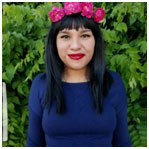
ANDREA PHIANA BORUNDA is a PhD Candidate in the Department of English at the University of New Mexico. She is the recipient of the Regents’ Winrock Research Fellowship, the UNM Division for Equity and Inclusion Community Engagement Fellowship, and the Rudolfo Anaya Folklore Scholar Award. Her social advocacy of BIPOC communities informs her scholarly work on racial fluidity, (trans)global identities, and ecocriticism curating a space of mestizaje and the borderlands in the tragicomic works of William Shakespeare. Her publications are featured in The Victorian, The Middle Ground Journal of World History and Global Studies, and the Pennsylvania Literary Journal.
Rachael Cassidy
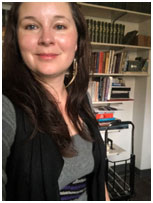
RACHAEL CASSIDY is an enrolled citizen of the Cherokee Nation of Oklahoma and is the first Native person to serve as the Managing Editor of the New Mexico Historical Review during its 95-year publication history. She is a doctoral candidate in the Department of History where she specializes in Indigenous history and methodologies, urban Native history, memory studies, and oral history. Her dissertation explores the social history of Native residents, Indigenous Diplomats, and local tribal nations in Washington, D.C. She hopes to make this research accessible by creating an interactive website that shares stories and primary sources with public audiences. Additionally, Rachael has a background in public history, which includes program development and education at the Smithsonian's National Museum of the American Indian, in Washington D.C.
Mark Cisneros
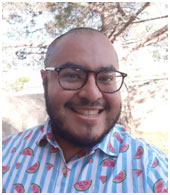
MARK CISNEROS is a PhD candidate in Hispanic Linguistics in the Department of Spanish and Portuguese at the University of New Mexico. He holds an M.A. in Spanish (Literature and Linguistics) from the University of Texas-Rio Grande Valley and a B.A. in Spanish from the University of Texas-Pan American. He specializes in Spanish Second Language (SSL) and Spanish Heritage Language (SHL) Acquisition and Pedagogy, sociolinguistics, and Spanish in the U.S. His dissertation focuses on the use of discourse markers in the academic writing of SSL and SHL learners in advanced, mixed writing courses. His research aims to determine whether SSL and SHL learners benefit from the same or different teaching methods with respect to the acquisition and production of DMs, with the goal of developing and advancing students’ writing skills.
Elspeth Iralu
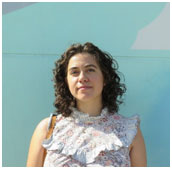
ELSPETH IRALU (Angami Naga) is a doctoral candidate in American studies. She is an Indigenous scholar working at the intersection of Indigenous studies, geography, and cultural studies. Iralu’s dissertation examines the aerial perspective as a technology of colonial territoriality. In this project, she considers the volume of Indigenous territories above, below, and on the surface of the earth to better understand the volumetric sovereignty of Indigenous nations and challenge new modes of colonial spatial surveillance and control. In addition to her scholarly work, Iralu has worked on Indigenous community projects for environment, health, and self-determination in India and the United States.
Pavlina Kalm
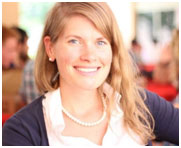
PAVLINA KALM is a PhD candidate in the Department of Linguistics at UNM. Her dissertation titled “The Semantics of Social Verbs: A Force-Dynamic Analysis” investigates the semantics of verbs that describe various types of social interactions. The semantic analysis is anchored in the notion of causation and our intuitive understanding of reality through the lens of causal interactions, i.e., who acts on whom. Her dissertation aims to contribute to our understanding of what aspects of verb meaning are grammatically relevant and sheds light on the underlying motivations that lead humans to construct language in systematic and predictable ways.
Mariah Partida
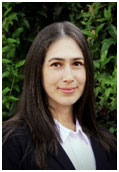
Mariah Partida is a PhD candidate in the Department of Philosophy at the University of New Mexico. Her research interests include existentialism, phenomenology, feminist ethics, and disability studies. Her dissertation aims to develop a novel conception of vulnerability, one that designates not merely susceptibility to harm, but also openness to unanticipated change and transformation. Conceived in this way, vulnerability in and of itself is neither good nor bad but fundamentally ambiguous. Drawing on the work of Martin Heidegger, Simone de Beauvoir, Judith Butler, Erinn Gilson, and Gilles Deleuze, she argues that vulnerability is not a static property borne by only some individuals, but rather a relational process that is fundamental to the human condition.
Sara Fairbanks Ukropen
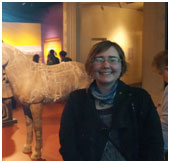
Sarah Fairbanks-Ukropen is a doctoral candidate in Medieval and Early Modern History at the University of New Mexico. Her research focus has been on women and power dynamics in those time periods, with special attention to the creation of hierarchies that still affect modern society. She received her MA from the University of New Mexico and a BA in History and Creative Writing from Warren-Wilson College. Her dissertation focusses on how canon law, secular legal systems and popular literature from the medieval period created power structures that encouraged violence against women in marriage.
Vicki Vanbrocklin
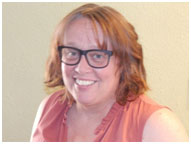
Vicki Vanbrocklin is a Ph.D. candidate in American Literary Studies in the UNM English Department. Her dissertation, “More than the Defiant Few: Lost Womanhood and Necro Women Dismantling Nineteenth-Century Gender Ideologies,” creates a ground-breaking category that includes women that would not or could not access a white middle-class form of womanhood, like True Womanhood, that depended on coloniality and patriarchy to define itself. This new category, Lost Womanhood, reveals that women have sought and created alternate forms of womanhood that acknowledge the successes of rebellious women. This new category normalizes their so-called unruly behavior when gender and literary studies have framed these women as outliers rather than effective changemakers.



